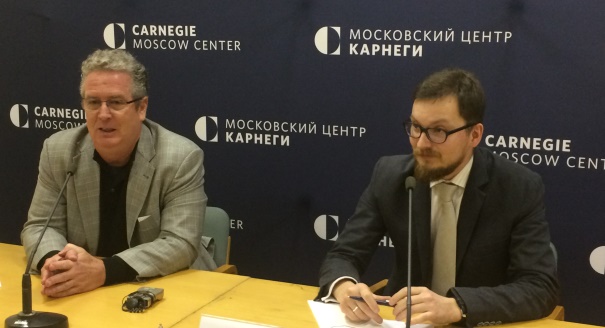Registration
You will receive an email confirming your registration.
The current U.S.–Russia relationship increasingly resembles that of the Cold War period. Cooperation between the two nations has essentially halted, and contact between Washington and Moscow has decreased dramatically. At the same time, the attention each country pays to the other in their respective domestic debates has increased significantly.
The Carnegie Moscow Center hosted Andrew Kuchins, a senior associate of the CSIS Russia and Eurasia Program and a former director of the Carnegie Moscow Center, for a discussion on the influence of domestic politics in U.S.–Russia relations. Carnegie Moscow Center’s Petr Topychkanov moderated.
Discussion Highlights
- Mutual Distrust: Kuchins noted that, in his opinion, the domestic politics in both Washington and Moscow is at the lowest level since the late 1970s, based on the sharpening perception of each other among the political elites in both countries. He offered several reasons, including:
- rising nationalism in Russia;
- negativity in media reporting—for example, demonization of Vladimir Putin in the Western media;
- “intellectual laziness” (Cold War mentality); and
- sharp disagreement, especially over European security order and the crisis in Syria.
- Invisible Successes: Kuchins also observed that the recent successes in U.S.-Russia cooperation have been underappreciated, since they didn’t “fit” the prevailing narrative by the media and political elites. Such successes include the conclusion of Iran nuclear deal, the joint solution to the disposal of Syria’s chemical weapons, and a more recent tendency to bring the positions of Russia and the United States over Syria closer together as the fight against the self-proclaimed Islamic State becomes more urgent.
- Going Forward: If two countries can continue to have some progress and some “good news” on these issues, it is going to create a much better environment for the new U.S. administration in a year’s time, Kuchins concluded.
Andrew Kuchins
Andrew Kuchins is a senior associate (nonresident) of the Center for Strategic and International Studies’ Russia and Eurasia Program. He is also a research associate at the Center for Eurasian, Russian and East European Studies (CERES) at Georgetown University. He was director of the Carnegie Moscow Center from 2003 to 2005.
Petr Topychkanov
Petr Topychkanov is an associate in the Carnegie Moscow Center’s Nonproliferation Program.
